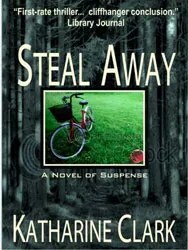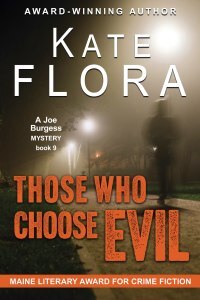Can You Afford to Get Published?
I wrote this post a decade ago. I’ve given it some tweaks, but it is still true. Probably more true now than ever. Unless you’re an A-List author, the burden of marketing mostly falls on you, and it is expensive. Fun, too, of course. Who doesn’t love meeting readers or getting new ones? But while most of us put a shiny face on things, the truth is that the business side of writing is a challenging one, even though it goes with the territory.
 Kate Flora here, with a question I’ve been pondering on again this week. Usually, published writers like to paint a glowy picture of the world we inhabit. It is true that having struggled, often for years, to finally become published, we are grateful for the chance to get our work out there and have it read, and I beam with pride when I look at my row of published books. But when I do the taxes, after putting together the figures for the past twelve months, I estimate that I’m working for about a dollar a day. I thought it might be interesting to readers to have some insight into the published author’s reality.
Kate Flora here, with a question I’ve been pondering on again this week. Usually, published writers like to paint a glowy picture of the world we inhabit. It is true that having struggled, often for years, to finally become published, we are grateful for the chance to get our work out there and have it read, and I beam with pride when I look at my row of published books. But when I do the taxes, after putting together the figures for the past twelve months, I estimate that I’m working for about a dollar a day. I thought it might be interesting to readers to have some insight into the published author’s reality.
I published my first mystery, Chosen for Death, back in 1994. For those early books in my Thea Kozak series, the advances ran around $5-6,000, and I usually earned royalties on top of that. For those of you who aren’t familiar with the way publishing works, when a publisher buys a book, they usually give the writer an advance of some amount that will be offset against the amount of money the work ultimately earns. Often this is divided with some money due on signing the contract, and another part due when the book is actually published, which may be a year or more down the road.
 I puttered along with my advances in this range until I sold my breakthrough book, Steal Away, (published as Katharine Clark) which had a big advance, was a book club selection, and was sold as an audio book. The book did not earn back that big advance and so, since publishers considering buying a book look at sales numbers, my happy midlist career was ruined.
I puttered along with my advances in this range until I sold my breakthrough book, Steal Away, (published as Katharine Clark) which had a big advance, was a book club selection, and was sold as an audio book. The book did not earn back that big advance and so, since publishers considering buying a book look at sales numbers, my happy midlist career was ruined.
But I am stubborn, so I kept on writing, and eventually sold my Joe Burgess series. Some time had passed and the advances had gotten smaller. Then I sold my first true crime, Finding Amy, to a university press. Another small advance that I shared with co-writer, Joe Loughlin.
And so it has gone. Selling something that has taken a year or five or twelve to write for a few thousand dollars does not seem like a sensible economic model. With smaller publishers, there may not even be an advance. In those cases, we publish on faith (faith on both sides) and hope for a return.
One year, I had two books published, my second true crime, Death Dealer: How Cops and Cadaver Dogs Brought a Killer to Justice, which I had worked on for five years, and the fourth Joe Burgess. The advances, combined, didn’t add up to the $6,000 I used to receive.
There are a lot of expenses involved in promoting a book. Many readers (and even writers aspiring to be published) don’t realize how many expenses are not covered by the publisher. For example: designing and maintaining a website, designing and printing publicity materials like flyers and bookmarks, buying copies of the book to give to people who’d helped during the writing process, buying copies of galleys to mail out for reviews, and postage for mailing. Then I have to buy copies of the books I hope to sell at book events, along with the expenses of the thousands of miles I put on my car. Also, of course, table covers, posters, book display racks, a folding table, and a handy little cart to tote is all to the venue.
And that’s not all. I was lucky enough to have Death Dealer be named an Agatha finalist, so I attended the Malice Domestic conference in Bethesda that June. Don’t get me wrong, conferences are wonderful places to network, hang with friends, get ideas, and be comforted in the presence of others who also hear voices in their heads. But, with airfare, hotels, and registration, a conference can easily cost a thousand dollars.
Twice, hoping for a breakthrough, I took a chance on hiring a publicist to see if I could break out and get my books greater recognition. Neither time did that work out. Thirty years in, I am still awaiting my breakthrough book.
Even when a book earns royalties, publisher routinely pay them only once or twice a year, and usually several months after the money has been earned, and traditionally hold back part of those earnings “against returns.” Most recently, a publisher sent me a royalty statement but hasn’t sent the check.
If an author is going the Indy model, or self-publishing, there are even more expenses. Formatting the print and ebooks unless you can do that yourself, getting a cover designed, maybe choosing to buy your own ISBNs.
 So here I sit, thirty years in, twenty-seven books in print and another, Those Who Choose Evil, due out this month. I have some wonderful successes along the way. The writing community has been generous. Death Dealer was an Agatha and Anthony finalist, and won the Public Safety Writers Association 2015 award for nonfiction. And Grant You Peace won the 2015 Maine Literary Award for Crime Fiction. I am humbled at the recognition and deeply grateful to my peers. I’ve received a lifetime achievement award from the Crime Bake and the Lea Wait Award from the Maine Crime Wave.
So here I sit, thirty years in, twenty-seven books in print and another, Those Who Choose Evil, due out this month. I have some wonderful successes along the way. The writing community has been generous. Death Dealer was an Agatha and Anthony finalist, and won the Public Safety Writers Association 2015 award for nonfiction. And Grant You Peace won the 2015 Maine Literary Award for Crime Fiction. I am humbled at the recognition and deeply grateful to my peers. I’ve received a lifetime achievement award from the Crime Bake and the Lea Wait Award from the Maine Crime Wave.
Logically speaking, I am deeply in the hole, though I am lucky enough to have my backlist available as e-books, which brings in some income. I need to make my books into audio books, which is another process to learn and one that takes time. I’m not entirely joking when I ask if someone would please send me a young person who can take care of Instagram and TikToc and all manner of marketing I never get to.
Obviously, I am not going to stop writing, and neither should you. But you should be warned: despite the honor of the thing, unless you have a best-seller, it is hard to make a living at this. That’s why we speak and teach and do manuscript reviews and a zillion other things and why we tell aspiring writers: don’t quit your day job, or be lucky enough to have a partner with benefits.
Lea Wait's Blog
- Lea Wait's profile
- 508 followers



